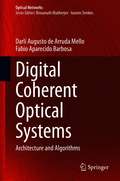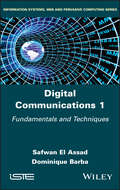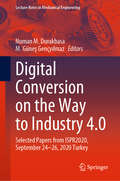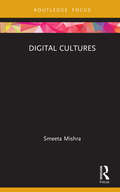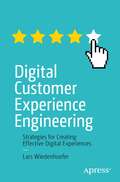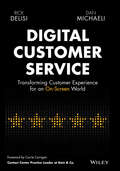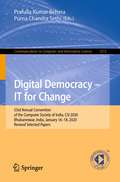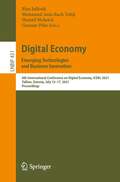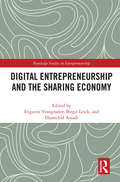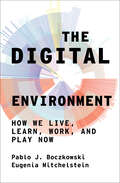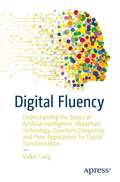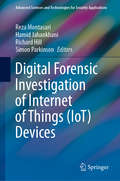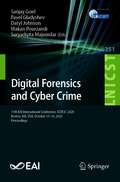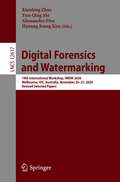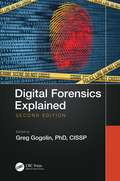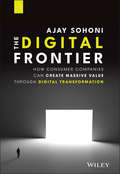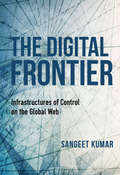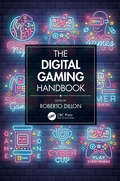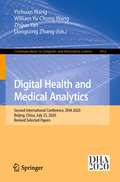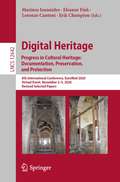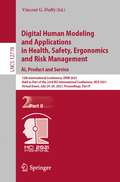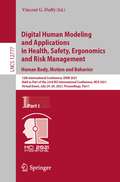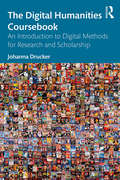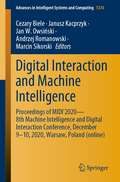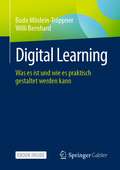- Table View
- List View
Digital Coherent Optical Systems: Architecture and Algorithms (Optical Networks)
by Darli Augusto de Arruda Mello Fabio Aparecido BarbosaThis textbook details the architecture of a digital coherent optical system and describes its main digital signal processing (DSP) algorithms. The authors first show how the combination of advanced modulation techniques, DSP and coherent detection has led to significant gains in capacity and ease of operation. The authors follow the path of the information from its generation in the transmitter, to propagation through the fiber and processing by the DSP algorithms in the receiver. The work summarizes academic results and presents them in a didactic way to students and practitioners working on the area of optical communications. A full suite of classroom materials is included for easy integration into a curriculum, containing theoretic and simulation problems, and off-the-shelf Matlab/Octave functions.
Digital Communications 1: Fundamentals and Techniques
by Safwan El Assad Dominique BarbaIt is a complete training in digital communications in the same book with all the aspects involved in such training: courses, tutorials with many typical problems targeted with detailed solutions, practical work concretely illustrating various aspects of technical implementation implemented. It breaks down into three parts. The Theory of information itself, which concerns both the sources of information and the channels of its transmission, taking into account the errors they introduce in the transmission of information and the means of protect by the use of appropriate coding methods. Then for the technical aspects of transmission, first the baseband transmission is presented with the important concept and fundamental technique of equalization. The performance evaluation in terms of probability of errors is systematically developed and detailed as well as the online codes used. Finally, the third part presents the Transmissions with digital modulation of carriers used in radio transmissions but also on electric cables. A second important aspect in learning a learner's knowledge and skills is this book. It concerns the "Directed Work" aspect of a training. This is an ordered set of 33 typical problems with detailed solutions covering the different parts of the course with practical work. Finally, the last aspect concerns the practical aspects in the proper sense of the term, an essential complement to training going as far as know-how. We propose here a set of 5 practical works.
Digital Conversion on the Way to Industry 4.0: Selected Papers from ISPR2020, September 24-26, 2020 Online - Turkey (Lecture Notes in Mechanical Engineering)
by Numan M. Durakbasa M. Güneş GençyılmazThis book presents the proceedings from the International Symposium for Production Research 2020. The cross-disciplinary papers presented draw on research from academics and practitioners from industrial engineering, management engineering, operational research, and production/operational management. It explores topics including: · computer-aided manufacturing; Industry 4.0 applications; simulation and modeling big data and analytics; flexible manufacturing systems; decision analysis quality management industrial robotics in production systems information technologies in production management; and optimization techniques. Presenting real-life applications, case studies, and mathematical models, this book is of interest to researchers, academics, and practitioners in the field of production and operation engineering.
Digital Cultures (Routledge Focus on Management and Society)
by Smeeta MishraThe book explores contemporary selfie-taking practices, digital experiences of love, romance and infidelity, sexting rituals, self-tracking habits, strategies used by the Internet famous, and the power of hashtag campaigns and memes in espousing a cause. Rejecting binary narratives on digital cultures, it showcases the fascinating ways in which we use our digital devices, social media platforms and apps by drawing upon academic research, everyday observations and a determination to challenge assumptions and hasty generalizations. It also engages with emerging narratives on online authenticity, privacy, digital detox, and the digital divides prevalent both in India and abroad.
Digital Customer Experience Engineering: Strategies for Creating Effective Digital Experiences
by Lars WiedenhoeferCustomer experience engineering applied to the engineering department is rare, but needed. Most companies keep support, UX, engineering, product, and CX separate. To address this gap, this book highlights roles and techniques that are proven to accelerate issue detection and prevention by 30% or more. With the author's vast experience in tech support, he has developed techniques and skills that allow engineers to gain customer insights faster and through new and insightful sources that are within their reach. You will develop a deep understanding of the impact of issues; understand and optimize the speed of the engineering feedback loop (issue resolution time); and develop the ability to calculate the cost of the issues or customer friction to the business (in aggregate and on a case-by-case basis). Organizations can save significant money and add additional revenue by addressing customer friction proactively in collaboration with product, engineering, and site reliability engineering (SRE) functions and reduce the average time of an issue resolution by 80%. The cross-functional leadership, mentoring, and engineering techniques you’ll learn from this proactive stance are very valuable and teachable, and this book will show you the path forward.What You Will LearnGain the techniques and tools necessary to validate customer journey success in productionContribute to customer-centric key performance indicators (KPIs) on executive dashboardsCreate meaningful insights and data points that allowed the feedback loop to be optimized and efficient Who This Book is ForProfessionals participating in the value stream of digital software engineering for the benefit of customer experiences, directly or indirectly. You may be an engineer practicing DevOps or site reliability, or you might be a product owner, UX designer, or researcher. You might be working in support and seeking for new ways to engage with your engineering teams.
Digital Customer Service: Transforming Customer Experience for an On-Screen World
by Rick DeLisi Dan MichaeliDigital Customer Service is the new standard for creating a 5-star customer experience As much as technology has improved our lives, for many people customer service experiences remain unnecessarily frustrating. But the advent of Digital Customer Service (DCS) promises to make these interactions seamless and effortless by creating experiences that occur entirely on a customer's own screen, even in situations where it is preferable to speak to an agent. Digital Customer Service: Transforming Customer Experience for an On-Screen World traces the evolution of customer service—as well as the evolution of customer expectations and the underlying psychology that drives customer behavior - from the days of the first call centers in the 1980s all the way to today's digital world. Written for Customer Service and Customer Experience leaders as well as C-suite executives (CEOs, CFOs, CIOs), Digital Customer Service helps business leaders balance three critical priorities: Creating an excellent experience for customers that increases customer loyalty and profitability Driving down the cost of Customer Service/Support interactions, while increasing revenue through Sales interactions Moving quickly toward the goal of "digital transformation" We have discovered—in our research and our first-hand experience—that when companies commit to achieving true Digital Customer Service, they can make significant progress toward all three of these goals at once. Digital Customer Service provides the roadmap for how your company can get there. And when you do, who wins? EVERYONE.
Digital Democracy – IT for Change: 53rd Annual Convention of the Computer Society of India, CSI 2020, Bhubaneswar, India, January 16–18, 2020, Revised Selected Papers (Communications in Computer and Information Science #1372)
by Prafulla Kumar Behera Purna Chandra SethiThis book constitutes the refereed proceedings of the 53rd Annual Convention of the Computer Society of India, CSI 2020, held in Bhubaneswar, India, in January 2020.The 3 revised full and 7 revised short papers, along with 1 poster paper, presented were carefully reviewed and selected from 144 submissions. The theme of CSI 2021, Digital Democracy – IT for Change, was selected to present the use of information and communication technology (ICT) in political and governance processes. The papers focus on topics such as digital democracy, digital communication, digital analytics and digital security.
Digital Economy. Emerging Technologies and Business Innovation: 6th International Conference on Digital Economy, ICDEc 2021, Tallinn, Estonia, July 15–17, 2021, Proceedings (Lecture Notes in Business Information Processing #431)
by Rim Jallouli Mohamed Anis Bach Tobji Hamid Mcheick Gunnar PihoThis book constitutes the proceedings of the 6th International Conference on Digital Economy, ICDEc 2021. The conference was held during July 15-17, 2021. It was initially planned to take place in Tallin, Estonia, but changed to a virtual event due to the COVID-19 pandemic.The 18 papers presented in this volume were carefully reviewed and selected from 51 submissions. They were organized in topical sections as follows: Digital strategies; virtual communities; digital assets and blockchain technology; artificial intelligence and data science; online education; digital transformation; and augmented reality and IOT.
Digital Entrepreneurship and the Sharing Economy (Routledge Studies in Entrepreneurship)
by Evgueni VinogradovThe digital and increasingly digitised world is shaped by the interplay of new technological opportunities and ubiquitous societal trends. Both lead to drastic changes facing artificial intelligence (AI), cryptocurrencies and block-chain technologies, internet of things, technology-based surveillance, and other disruptive innovations. These developments facilitate the rise of the sharing economy and open for a variety of new entrepreneurial opportunities that businesses can take up. The novel entrepreneurial opportunities, however, imply a paradigmatic shift in the understanding of entrepreneurship. This book combines digital entrepreneurship with the sharing economy. It presents cutting-edge research for scholars and practitioners interested in either one of the topics – digital entrepreneurship or sharing economy – or their connection. The book addresses three major ways to become entrepreneurial in the sharing economy: digital entrepreneurship through creating novel sharing-economy platforms; technology entrepreneurship through the exploitation of sharing-economy platforms; and business model innovation or business model change influenced by the sharing economy. The book also highlights governance questions on digital entrepreneurship in the sharing economy, which are highly relevant for businesses, the economy, and society. The book will be of interested to researchers, academics, and students in the field of business and entrepreneurship, with a special focus on digital entrepreneurship.
The Digital Environment: How We Live, Learn, Work, and Play Now
by Pablo J. Boczkowski Eugenia MitchelsteinUnderstanding digital technology in daily life: why we should think holistically in terms of a digital environment instead of discrete devices and apps.Increasingly we live through our personal screens; we work, play, socialize, and learn digitally. The shift to remote everything during the pandemic was another step in a decades-long march toward the digitization of everyday life made possible by innovations in media, information, and communication technology. In The Digital Environment, Pablo Boczkowski and Eugenia Mitchelstein offer a new way to understand the role of the digital in our daily lives, calling on us to turn our attention from our discrete devices and apps to the array of artifacts and practices that make up the digital environment that envelops every aspect of our social experience. Boczkowski and Mitchelstein explore a series of issues raised by the digital takeover of everyday life, drawing on interviews with a variety of experts. They show how existing inequities of gender, race, ethnicity, education, and class are baked into the design and deployment of technology, and describe emancipatory practices that counter this--including the use of Twitter as a platform for activism through such hashtags as #BlackLivesMatter and #MeToo. They discuss the digitization of parenting, schooling, and dating--noting, among other things, that today we can both begin and end relationships online. They describe how digital media shape our consumption of sports, entertainment, and news, and consider the dynamics of political campaigns, disinformation, and social activism. Finally, they report on developments in three areas that will be key to our digital future: data science, virtual reality, and space exploration.
Digital Fluency: Understanding the Basics of Artificial Intelligence, Blockchain Technology, Quantum Computing, and Their Applications for Digital Transformation
by Volker LangIf you are curious about the basics of artificial intelligence, blockchain technology, and quantum computing as key enablers for digital transformation and innovation, Digital Fluency is your handy guide. The real-world applications of these cutting-edge technologies are expanding rapidly, and your daily life will continue to be affected by each of them. There is no better time than now to get started and become digitally fluent.You need not have previous knowledge of these versatile technologies, as author Volker Lang will expertly guide you through this digital age. He illustrates key concepts and applications in numerous practical examples and more than 48 catchy figures throughout Digital Fluency. The end of each chapter presents you with a helpful implementation checklist of central lessons before proceeding to the next. This book gets to the heart of digital buzzwords and concepts, and tells you what they truly mean. Breaking down topics such as automated driving and intelligent robotics powered by artificial intelligence, blockchain-based cryptocurrencies and smart contracts, drug development and optimization of financial investment portfolios by quantum computing, and more is imperative to being ready for what the future of industry holds. Whether your own digital transformation journey takes place within your private or public organization, your studies, or your individual household, Digital Fluency maps out a concrete digital action plan for all of your technology and innovation strategy needs.What You Will Learn Gain guidance in the digital age without requiring any previous knowledge about digital technologies and digital transformationGet acquainted with the most popular current and prospective applications of artificial intelligence, blockchain technology, and quantum computing across a wide range of industries including healthcare, financial services, and the automobile industryBecome familiar with the digital innovation models of Amazon, Google, Microsoft, IBM, and other world-leading organizations Implement your own digital transformation successfully along the eight core dimensions of a concrete digital action planWho This Book Is ForThought-leaders, business executives and industry strategists, management and strategy consultants, politicians and policy makers, entrepreneurs, financial analysts, investors and venture capitalists, students and research scientists, as well as general readers, who want to become digitally fluent.
Digital Forensic Investigation of Internet of Things (Advanced Sciences and Technologies for Security Applications)
by Reza Montasari Hamid Jahankhani Richard Hill Simon ParkinsonThis book provides a valuable reference for digital forensics practitioners and cyber security experts operating in various fields of law enforcement, incident response and commerce. It is also aimed at researchers seeking to obtain a more profound knowledge of Digital Forensics and Cybercrime. Furthermore, the book is an exceptional advanced text for PhD and Master degree programmes in Digital Forensics and Cyber Security. Each chapter of this book is written by an internationally-renowned expert who has extensive experience in law enforcement, industry and academia. The increasing popularity in the use of IoT devices for criminal activities means that there is a maturing discipline and industry around IoT forensics. As technology becomes cheaper and easier to deploy in an increased number of discrete, everyday objects, scope for the automated creation of personalised digital footprints becomes greater. Devices which are presently included within the Internet of Things (IoT) umbrella have a massive potential to enable and shape the way that humans interact and achieve objectives. These also forge a trail of data that can be used to triangulate and identify individuals and their actions. As such, interest and developments in autonomous vehicles, unmanned drones and ‘smart’ home appliances are creating unprecedented opportunities for the research communities to investigate the production and evaluation of evidence through the discipline of digital forensics.
Digital Forensics and Cyber Crime: 11th EAI International Conference, ICDF2C 2020, Boston, MA, USA, October 15-16, 2020, Proceedings (Lecture Notes of the Institute for Computer Sciences, Social Informatics and Telecommunications Engineering #351)
by Sanjay Goel Pavel Gladyshev Daryl Johnson Makan Pourzandi Suryadipta MajumdarThis book constitutes the refereed proceedings of the 11th International Conference on Digital Forensics and Cyber Crime, ICDF2C 2020, held in Boston, MA, in October 2020. Due to COVID-19 pandemic the conference was held virtually. The 11 reviewed full papers and 4 short papers were selected from 35 submissions and are grouped in topical sections on digital forensics; cyber-physical system Forensics; event reconstruction in digital forensics; emerging topics in forensics; cybersecurity and digital forensics.
Digital Forensics and Watermarking: 19th International Workshop, IWDW 2020, Melbourne, VIC, Australia, November 25–27, 2020, Revised Selected Papers (Lecture Notes in Computer Science #12617)
by Xianfeng Zhao Yun-Qing Shi Alessandro Piva Hyoung Joong KimThis volume constitutes the proceedings of the 19th International Workshop on Digital Forensics and Watermarking, IWDW 2020, held in Melbourne, VIC, Australia, in November 2020.The 20 full papers in this volume were carefully reviewed and selected from 43 submissions. They cover topics such as: novel research, development and application of digital watermarking and forensics techniques for multimedia security.
Digital Forensics Explained
by Greg GogolinThis book covers the full life cycle of conducting a mobile and computer digital forensic examination, including planning and performing an investigation as well as report writing and testifying. Case reviews in corporate, civil, and criminal situations are also described from both prosecution and defense perspectives. Digital Forensics Explained, Second Edition draws from years of experience in local, state, federal, and international environments and highlights the challenges inherent in deficient cyber security practices. Topics include the importance of following the scientific method and verification, legal and ethical issues, planning an investigation (including tools and techniques), incident response, case project management and authorization, social media and internet, cloud, anti-forensics, link and visual analysis, and psychological considerations. The book is a valuable resource for the academic environment, law enforcement, those in the legal profession, and those working in the cyber security field. Case reviews include cyber security breaches, anti-forensic challenges, child exploitation, and social media investigations. Greg Gogolin, PhD, CISSP, is a Professor of Information Security and Intelligence at Ferris State University and a licensed Professional Investigator. He has worked more than 100 cases in criminal, civil, and corporate environments.
The Digital Frontier: How Consumer Companies Can Create Massive Value Through Digital Transformation
by Ajay SohoniDiscover how to move forward with your own company’s digital transformation with this accessible new resource from a global leader in his field In The Digital Frontier, experienced executive and distinguished author Ajay Sohoni delivers a relatable and readable reference for corporate executives who need the knowledge and confidence to build lasting digital change within their enterprise. From marketing to commercial, supply chain, and finance, the book offers actionable insights in an accessible format, full of anecdotes, humor, and case examples. You’ll learn which areas to focus on and which not to worry about as you craft your own custom transformation journey. In the book, you’ll also find: A demystification of the startup world for executives and an explanation of why unicorns exist (and so often ultimately fail) A detailed description of the digital transformation gripping companies across a variety of industries in functional areas including advertising, engagement, commerce, product development, manufacturing, and corporate functions A simplified 4-stage framework for companies to start from scratch and build valuable use cases Perfect for executives in consumer-facing companies, corporate managers and leaders, business unit heads and management teams, The Digital Frontier is also an indispensable guide for digital non-natives trying to make sense of, and keep up with, the rapidly changing world around them.
The Digital Frontier: Infrastructures of Control on the Global Web (Framing the Global)
by Sangeet KumarThe global web and its digital ecosystem can be seen as tools of emancipation, communication, and spreading knowledge or as means of control, fueled by capitalism, surveillance, and geopolitics.The Digital Frontier interrogates the world wide web and the digital ecosystem it has spawned to reveal how their conventions, protocols, standards, and algorithmic regulations represent a novel form of global power. Sangeet Kumar shows the operation of this power through the web's "infrastructures of control" visible at sites where the universalizing imperatives of the web run up against local values, norms, and cultures. These include how the idea of the "global common good" is used as a ruse by digital oligopolies to expand their private enclosures, how seemingly collaborative spaces can simultaneously be exclusionary as they regulate legitimate knowledge, how selfhood is being redefined online along Eurocentric ideals, and how the web's political challenge is felt differentially by sovereign nation states. In analyzing this new modality of cultural power in the global digital ecosystem, The Digital Frontier is an important read for scholars, activists, academics and students inspired by the utopian dream of a truly representative global digital network.
The Digital Gaming Handbook
by Roberto DillonThe Digital Gaming Handbook covers the state-of-the-art in video and digital game research and development, from traditional to emerging elements of gaming across multiple disciplines. Chapters are presented with applicability across all gaming platforms over a broad range of topics, from game content creation through gameplay at a level accessible for the professional game developer while being deep enough to provide a valuable reference of the state-of-the-art research in this field. Key Features: International experts share their research and experience in game development and design Provides readers with inside perspectives on the cross-disciplinary aspects of the industry Includes retrospective and forward-looking examinations of gaming Editor: Dr. Roberto Dillon is a leading game studies educator with more than 15 years of experience in the field of game design and development.
Digital Health and Medical Analytics: Second International Conference, DHA 2020, Beijing, China, July 25, 2020, Revised Selected Papers (Communications in Computer and Information Science #1412)
by Yichuan Wang William Yu Chung Wang Zhijun Yan Dongsong ZhangThis book constitutes selected and revised papers from the Second International Conference on Digital Health and Medical Analytics, DHA 2020, held in Beijing, China, in July 25, 2020.The 5 full papers and 7 short papers presented in this volume were thoroughly reviewed and selected from 75 submissions. The papers present discussion on such topics as social networks, analytics and engagement with health devices, big data, public health surveillance, persuasive technologies, epidemic intelligence, participatory surveillance, emergency medicine, serious games for public health interventions and automated early identification of health threats and responses.
Digital Heritage. Progress in Cultural Heritage: 8th International Conference, EuroMed 2020, Virtual Event, November 2–5, 2020, Revised Selected Papers (Lecture Notes in Computer Science #12642)
by Marinos Ioannides Eleanor Fink Lorenzo Cantoni Erik ChampionThis book constitutes the refereed post-conference proceedings of the 8th International Conference on Digital Heritage, EuroMed 2020, held virtually in November 2020.The 37 revised project papers and 30 revised short papers presented were carefully reviewed and selected from 326 submissions. The papers are on topics such as digital data acquisition technologies in CH/2D and 3D data capture methodologies and data processing; remote sensing for archaeology and cultural heritage management and monitoring; interactive environments and applications; reproduction techniques and rapid prototyping in CH; e-Libraries and e-Archives in cultural heritage; virtual museum applications (e-Museums and e-Exhibitions); visualisation techniques (desktop, virtual and augmented reality); storytelling and authoring tools; tools for education; 2D and 3D GIS in cultural heritage; and on-site and remotely sensed data collection.
Digital Human Modeling and Applications in Health, Safety, Ergonomics and Risk Management. AI, Product and Service: 12th International Conference, DHM 2021, Held as Part of the 23rd HCI International Conference, HCII 2021, Virtual Event, July 24–29, 2021, Proceedings, Part II (Lecture Notes in Computer Science #12778)
by Vincent G. DuffyThis two-volume set LNCS 12777 and 12778 constitutes the thoroughly refereed proceedings of the 12th International Conference on Digital Human Modeling and Applications in Health, Safety, Ergonomics and Risk Management, DHM 2021, which was held virtually as part of the 23rd HCI International Conference, HCII 2021, in July 2021.The total of 1276 papers and 241 posters included in the 39 HCII 2021 proceedings volumes was carefully reviewed and selected from 5222 submissions. DHM 2021 includes a total of 56 papers; they were organized in topical sections named: Part I, Human Body, Motion and Behavior: Ergonomics, human factors and occupational health; human body and motion modeling; and language, communication and behavior modeling. Part II, AI, Product and Service: Rethinking healthcare; artificial intelligence applications and ethical issues; and digital human modeling in product and service design.
Digital Human Modeling and Applications in Health, Safety, Ergonomics and Risk Management. Human Body, Motion and Behavior: 12th International Conference, DHM 2021, Held as Part of the 23rd HCI International Conference, HCII 2021, Virtual Event, July 24–29, 2021, Proceedings, Part I (Lecture Notes in Computer Science #12777)
by Vincent G. DuffyThis two-volume set LNCS 12777 and 12778 constitutes the thoroughly refereed proceedings of the 12th International Conference on Digital Human Modeling and Applications in Health, Safety, Ergonomics and Risk Management, DHM 2021, which was held virtually as part of the 23rd HCI International Conference, HCII 2021, in July 2021.The total of 1276 papers and 241 posters included in the 39 HCII 2021 proceedings volumes was carefully reviewed and selected from 5222 submissions. DHM 2021 includes a total of 56 papers; they were organized in topical sections named: Part I, Human Body, Motion and Behavior: Ergonomics, human factors and occupational health; human body and motion modeling; and language, communication and behavior modeling. Part II, AI, Product and Service: Rethinking healthcare; artificial intelligence applications and ethical issues; and digital human modeling in product and service design.
The Digital Humanities Coursebook: An Introduction to Digital Methods for Research and Scholarship
by Johanna DruckerThe Digital Humanities Coursebook provides critical frameworks for the application of digital humanities tools and platforms, which have become an integral part of work across a wide range of disciplines. Written by an expert with twenty years of experience in this field, the book is focused on the principles and fundamental concepts for application, rather than on specific tools or platforms. Each chapter contains examples of projects, tools, or platforms that demonstrate these principles in action. The book is structured to complement courses on digital humanities and provides a series of modules, each of which is organized around a set of concerns and topics, thought experiments and questions, as well as specific discussions of the ways in which tools and platforms work. The book covers a wide range of topics and clearly details how to integrate the acquisition of expertise in data, metadata, classification, interface, visualization, network analysis, topic modeling, data mining, mapping, and web presentation with issues in intellectual property, sustainability, privacy, and the ethical use of information. Written in an accessible and engaging manner, The Digital Humanities Coursebook will be a useful guide for anyone teaching or studying a course in the areas of digital humanities, library and information science, English, or computer science. The book will provide a framework for direct engagement with digital humanities and, as such, should be of interest to others working across the humanities as well.
Digital Interaction and Machine Intelligence: Proceedings of MIDI’2020 – 8th Machine Intelligence and Digital Interaction Conference, December 9-10, 2020, Warsaw, Poland (online) (Advances in Intelligent Systems and Computing #1376)
by Cezary Biele Janusz Kacprzyk Jan W. Owsiński Andrzej Romanowski Marcin SikorskiThis book presents the Proceedings of MIDI’2020 – 8th Machine Intelligence and Digital Interaction Conference, December 9–10, 2020, Warsaw, Poland, held online. The rapid development of artificial intelligence (AI) and its growing applications in many fields, such as intelligent voice assistants, e-commerce (chatbots) or navigation, make end users increasingly exposed to such systems. In a world where technological solutions based on artificial intelligence are created by people for people, the final success or failure of a newly created product depends on the focus on human needs. Therefore, it is important to integrate so far independent scientific areas: broadly defined artificial intelligence and human–technology interaction. This book is intended for specialists in the above fields and attempts to integrate the perspectives of engineers and social scientists. The book is a source of inspiration as well as practical and theoretical knowledge for all readers interested in new trends in the field of user-centered AI solutions.
Digital Learning: Was es ist und wie es praktisch gestaltet werden kann
by Bodo Möslein-Tröppner Willi BernhardDieses Buch gibt dem Leser einen Einblick in die vielfältigen Möglichkeiten, die das Digital Learning bietet. Diese kann er sogleich ausprobieren und selber anwenden. Die Autoren zeigen, wie sich 360-Grad-Lernen im virtuellen Raum umsetzen lässt (Immersive Learning) oder welche nützlichen digitalen Tools beim Lernen und in der virtuellen Zusammenarbeit (Digital Collaboration) verwendet werden können. Der Einsatz der Blockchain-Technologie in der Bildung wird genauso behandelt wie die Umsetzung praktischer digitaler Unterrichtsformen wie der Hybridunterricht als Lernform der Zukunft. Einen weiteren Schwerpunkt bildet die Künstliche Intelligenz (KI) im Digital Learning. Dazu zählen die Anwendung digitaler Sprachassistenten und wissensbasierter Applikationen zur Lösungsfindung ebenso wie die Überprüfung von Home-Based-Prüfungen. Ergänzt werden die vielfältigen Möglichkeiten des digital unterstützten Lernens durch die Anwendung des Digital Storytelling und des spielbasierten Lernens. Nach dem Lesen des Buchs weiß der Leser, was Digital Learning ist und wie es gestaltet werden kann. Für die verschiedensten Ideen und Anforderungen, die sich aus der individuellen Lern- bzw. Lehrsituation ergeben, finden sich einfach umsetzbare digitale Lösungen.
